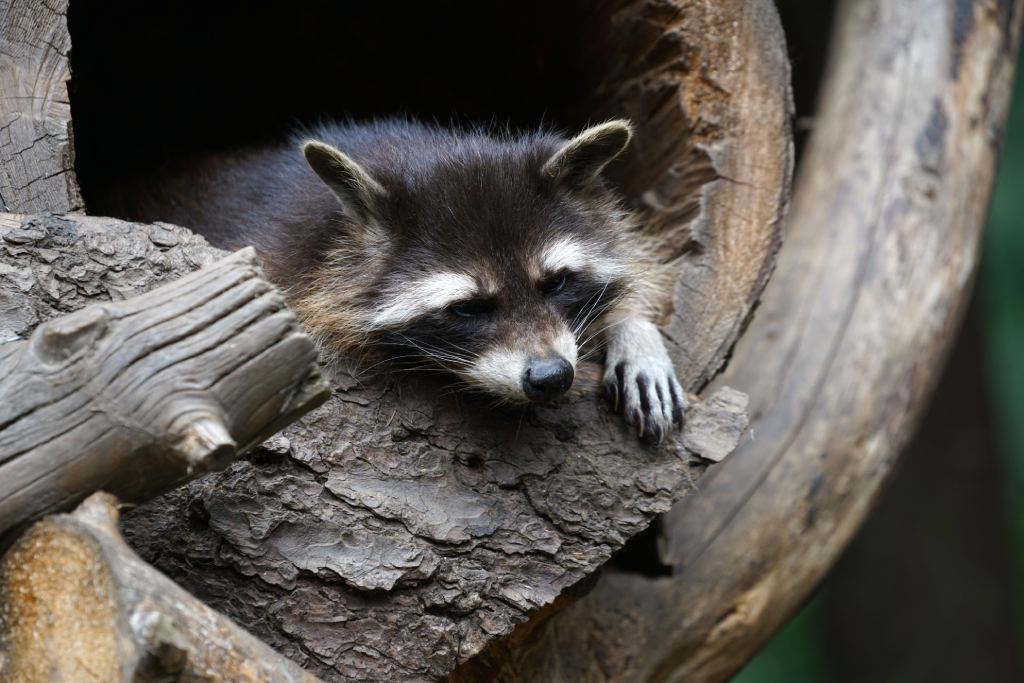Raccoons, with their distinctive black mask and bushy ringed tail, are among the most recognizable wildlife species in North America. These nocturnal creatures are known for their adaptability and intelligence, but one aspect of their life that remains a mystery to many is their mating habits. In this article, we delve deep into the world of raccoon mating to provide insights and facts that will enlighten and inform.
Key Takeaways
- Raccoons have a specific mating season that can start as early as January and end in June.
- Female raccoons establish more permanent dens when they are about to give birth.
- Prevention is key to ensuring raccoons don't become a nuisance on your property.
- Relocating raccoons is illegal in some states due to the potential harm it can cause to the animals and the environment.
Raccoon Mating Season: The Basics

When Does the Mating Season Start and End?
The breeding season for raccoons can commence as early as January and culminate in June. The peak of this mating season is typically observed from March through April. As the weather begins to warm, raccoons become more active and start their breeding rituals. It's essential to note that raccoons have a gestation period of approximately 65 days. After giving birth, the mother raccoon and her kits will stay in their den for up to 7 weeks.
The Significance of Dens
Dens play a crucial role during the raccoon mating season. While raccoons frequently change dens outside of the breeding season, a female raccoon will establish a more permanent den when she's about to give birth. Preferred den locations include hollow trees, attics, and chimney flues. If these spots are unavailable, raccoons will seek undisturbed areas like beneath homes or decks.
Prevention and Control
Raccoons are opportunistic creatures. If they find a location that provides food, shelter, and safety, they're likely to settle there. Here are some measures you can take to make your property less appealing to raccoons:
- Don't feed them: This might seem obvious, but leaving food out, whether intentionally or unintentionally, will attract raccoons.
- Seal garbage sources: Ensure your trash cans are securely closed to prevent raccoons from scavenging.
- Feed pets indoors: If you have outdoor pets, make sure their food is not accessible to wildlife.
- Secure compost: Instead of leaving food scraps exposed, use compost containers.
- Eliminate potential dens: Fill or block any holes or spaces that raccoons might use as dens.
For more prevention tips, consider visiting PURCOR's guide on raccoon prevention.
Relocation: Not Always the Best Solution
While it might seem like a humane solution to trap and relocate a nuisance raccoon, it's essential to note that this practice is illegal in some states, including Oregon and Washington. Relocating raccoons can lead to several adverse outcomes, such as the spread of diseases and ecological imbalances. If you find raccoons on your property, it's best to consult with a wildlife removal specialist.
Raccoon Mating Facts: A Quick Table
| Fact | Description |
|---|---|
| Mating Season | January to June, with a peak in March-April |
| Gestation Period | Approximately 65 days |
| Den Usage | Female raccoons establish more permanent dens when about to give birth |
| Preferred Den Locations | Hollow trees, attics, chimney flues |
| Relocation | Illegal in some states due to potential harm to raccoons and the environment |
Understanding Raccoon Dens

The Role of Dens in Raccoon Life
Dens are an integral part of a raccoon's life, especially during the mating season. Outside of this period, raccoons are known to change dens frequently. They don't typically construct these dens but capitalize on pre-existing empty spaces. If you notice a raccoon settling in a tree or other open space on your property, they'll likely move on in a day or two. However, when it comes to more permanent structures like your home, ensuring they've fully vacated is crucial before sealing any entry points.
Choosing the Perfect Den
When a female raccoon is preparing to breed and give birth, she becomes more selective about her den. Raccoons have a preference for elevated locations like hollow trees, attics, and chimney flues. If these options are unavailable, they'll opt for places where they're unlikely to be disturbed, such as beneath homes or decks. The impending birth of her kits makes her even more discerning in her choice.
For more insights on raccoon dens and their behavior, consider checking out this detailed article on raccoon habits.
Preventing Raccoon Intrusion
Raccoons are highly adaptable creatures, and if they find an environment that caters to their needs, they'll make themselves at home. Here are some actionable steps to deter raccoons:
- Secure food sources: Whether it's pet food, garbage, or compost, ensure it's inaccessible to raccoons.
- Seal potential entry points: Regularly inspect your home for holes or gaps that raccoons might exploit and seal them.
- Consult with neighbors: A community-wide effort can be more effective in keeping raccoons at bay.
For a comprehensive guide on raccoon prevention, click here.
Raccoon Relocation: Think Twice
Relocating raccoons might seem like a compassionate approach, but it's fraught with challenges. In states like Oregon and Washington, raccoon relocation is illegal due to the potential repercussions for the raccoons and the broader ecosystem. If you're dealing with raccoons on your property, it's advisable to contact a wildlife removal specialist.
Frequently Asked Questions
When is the peak of the raccoon mating season?
The peak of the raccoon mating season is from March to April.
How long is the raccoon gestation period?
Raccoons have a gestation period of approximately 65 days.
Are raccoons solitary animals?
Yes, raccoons are generally solitary creatures. However, they come together during the mating season. For more details, read here.
Is it legal to relocate raccoons?
In some states, such as Oregon and Washington, relocating raccoons is illegal due to the potential harm it can cause to the animals and the environment.
How can I prevent raccoons from entering my property?
Securing food sources, sealing potential entry points, and consulting with neighbors are effective strategies to deter raccoons.





